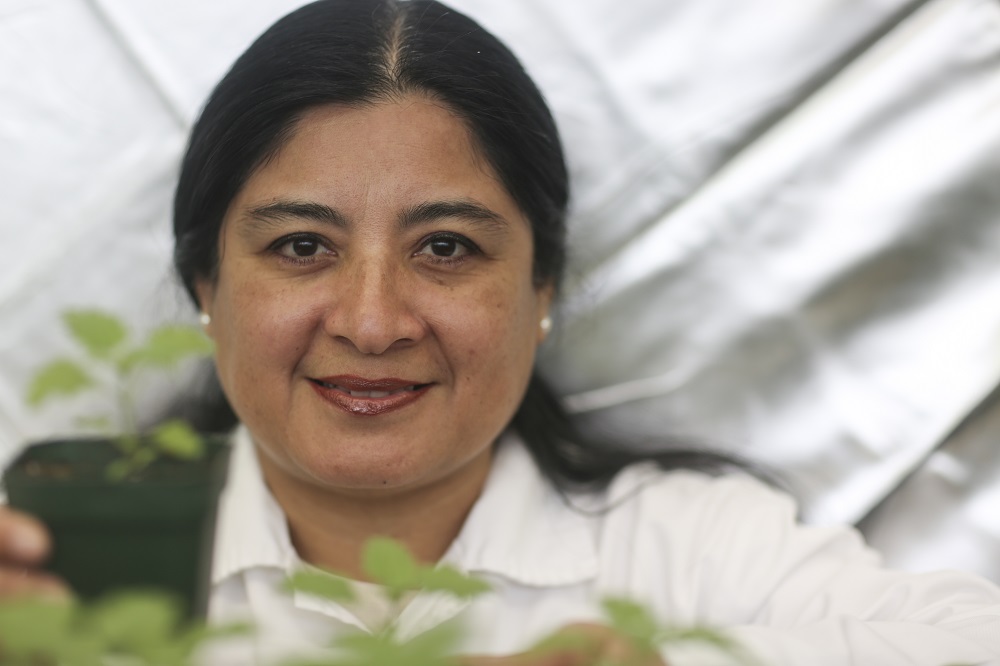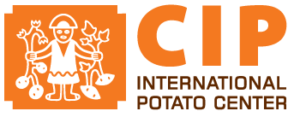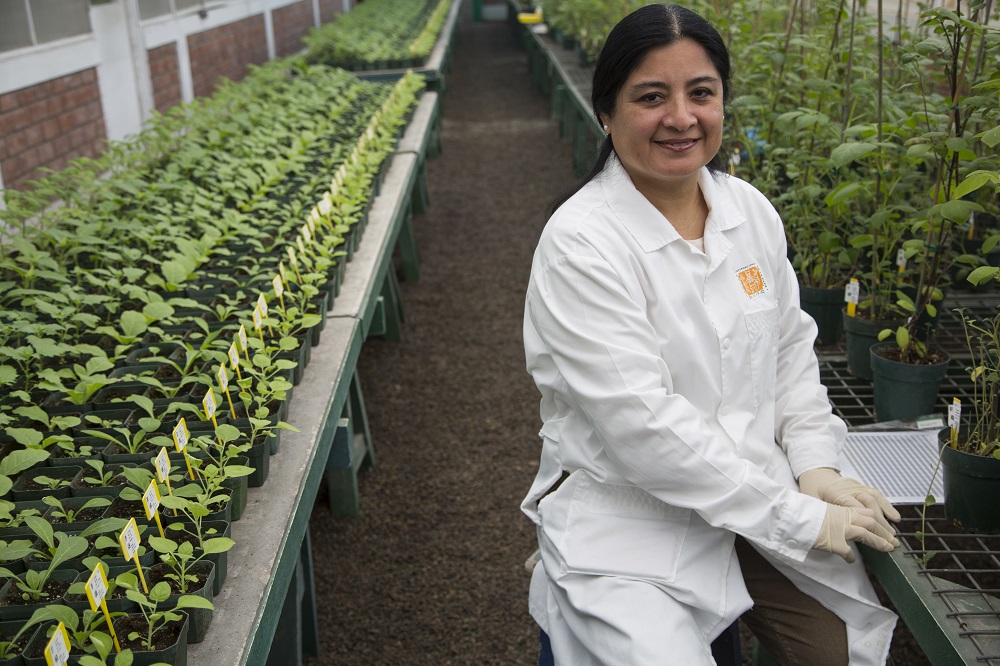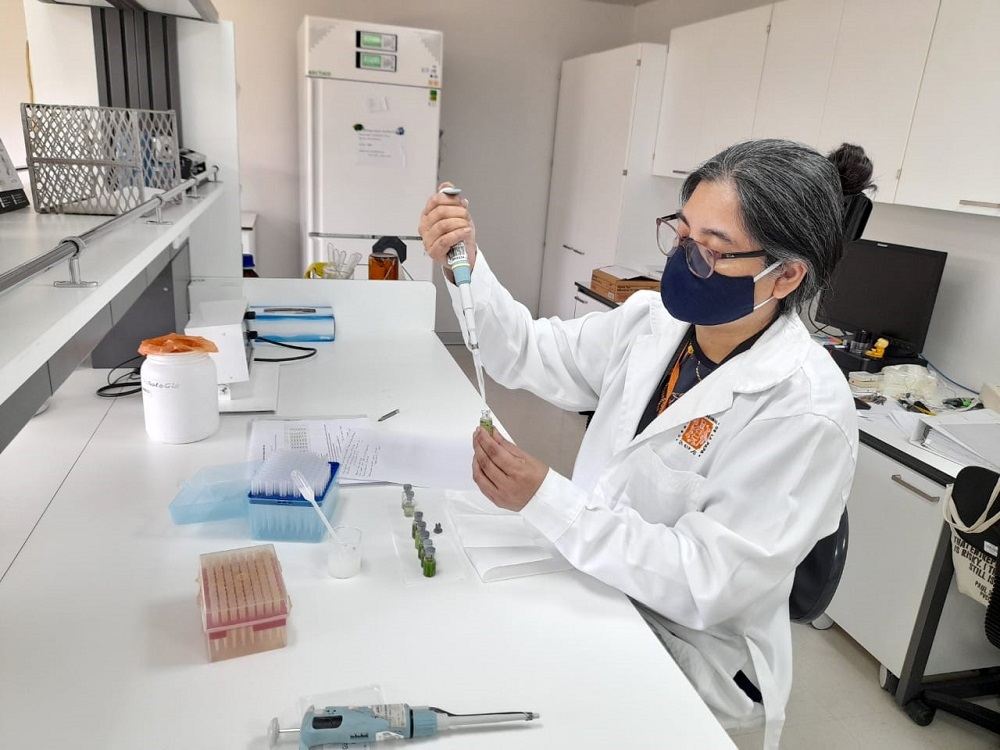I think it is very important to promote and better communicate what science means, how scientists are trying to preserve our wonderful world, and that there is space, always, for people with a big amount of curiosity and a personal goal of contributing to making this world a better place to live for all.

(Photo by Sara Fajardo, CIP)
.. Established in 1971, the International Potato Center (CIP) is a research-for-development organization focusing on potato, sweet potato, and Andean roots and tubers. It delivers innovative science-based solutions to enhance access to affordable nutritious food, foster inclusive sustainable business and employment growth, and drive the climate resilience of root and tuber agri-food systems. Headquartered in Lima, Peru, CIP has a research presence in more than 20 countries in Africa, Asia, and Latin America.
Established in 1971, the International Potato Center (CIP) is a research-for-development organization focusing on potato, sweet potato, and Andean roots and tubers. It delivers innovative science-based solutions to enhance access to affordable nutritious food, foster inclusive sustainable business and employment growth, and drive the climate resilience of root and tuber agri-food systems. Headquartered in Lima, Peru, CIP has a research presence in more than 20 countries in Africa, Asia, and Latin America.
CIP’s accomplishments, among others, include increasing yields and incomes for more than 2 million smallholder farmers in Asia and Africa and improving the nutritional status of approximately 6.5 households through the introduction and dissemination of vitamin A-rich orange-fleshed sweet potato. CIP also shares more than 5,000 germplasm samples annually with other research organizations to develop more nutritious, productive, and climate-resilient varieties.
This edition of Women of scientific substance features Giovanna Müller who leads CIP’s Science Laboratories Unit and is the deputy head of the Health & Quarantine Unit.
Why did you choose to become a scientist?
When I was a child, I remember I liked my biology classes a lot. Later, when I was almost a teenager, I really enjoyed watching documentaries on TV such as The Undersea World of Jacques Cousteau and Cosmos: A Personal Voyage presented by Carl Sagan.
I was inspired by scientists like Cousteau and Sagan to become a scientist myself and aroused great curiosity in me to know everything about the mysteries of life. Nature is wonderful and powerful, and I was fascinated with the world they discovered for the audience. I admired their passion and perseverance.
I recall thinking being a scientist would be the best profession ever! And I still think it is.
What is your scientific background and how did you choose your field of research?
I am a biologist with a Master’s studies in molecular biology and biochemistry and I have been working on the identification, characterization, and diagnosis of potato and sweet potato viruses, viroids, and phytoplasms at CIP for 26 years now.
While doing my undergraduate studies at the Ricardo Palma University, I liked botany and ecology the most and I already knew I wanted to be a scientist. By the time I was about to finish my studies, it was clear to me that I would apply for an internship at CIP, a renowned research center worldwide, which luckily for me, based in my country.
I was so happy when I got the opportunity! I started my career in crop protection at CIP where I discovered the world of plant viruses. I was captivated by them and somehow, I could say I also work on botany and ecology trying to learn about the interaction between plant hosts and pathogens.
What are you working on at the moment?
I lead the Plant Pathology Laboratory, which holds an ISO/IEC 17025:2017 accreditation for 12 years now. We provide services on plant virus diagnostics for CIP’s mandate crops which are potato, sweet potato, and Andean roots and tuber crops. I am involved in research projects that look for new approaches to improve pathogens diagnosis such as the standardization and validation of High Throughput Sequencing (HTS) where CIP is a pioneer in using this technology in plant virus diagnostics.
I am also a member of the Health and Quarantine Unit at CIP which has the big responsibility of approving the distribution of germplasm locally and abroad ensuring the compliance of phytosanitary policies and measures established by CIP, the National Plant Protection Organization (NPPO) as well as by the International Plant Protection Convention.
Why did you choose this and how do you think you’ll make a difference in the lives of your target audience?
I chose this research area because it is fascinating and it allowed me to know my country through the various trips I made across the years conducting surveys, first locally and then abroad. The surveys were conducted to determine the presence of viruses and/or other pathogens in the field and estimate their incidence.
We also support national agricultural research institutes (NARIs) and NPPOs by sharing with them the results of our research and transferring knowledge to build their capacity and, through them, contribute to improving the yield of these ancient, incredibly diverse, and nutritious crops.
Ultimately, we help smallholder farmers increase their incomes, and, hopefully, if they sell more potatoes and sweet potatoes, consumers will improve their diet with more nutritious food.

(Photo by Sara Fajardo, CIP)
.
What are the hardest challenges related to your work?
Funding and time. Getting funds to study plant pathogens as potential threats to crop production and the further development of diagnostics methods for their accurate detection, which is the basis for ensuring the safe movement of genetic resources around the globe, is becoming more and more a very challenging endeavor. If you live in a country that is not considered poor, it can become more than a challenge for scientists.
But I see with optimism that, as what is happening with research on the COVID-19 virus, donors (private and public) and scientists around the world are already joining efforts to develop big multidisciplinary and international projects as a global community and looking for ways to ensure the required funds. A good example is the One CGIAR initiative.
Regarding time, because of the increasing need of researchers for exchanging the huge amount of data they generate through the use of new technologies, such as HTS, and the need to make it available and workable to other researchers, it is critical to make more and important advances in less time and reduce the duplication of efforts and the associated costs.
Examples that aim to reach these goals are Open Access and Big Data initiatives which are achieving a significant increase in the access and use of metadata by making it available to any researcher in any part of the world who may need it.
Is there any research topic that you think should have more scientific attention?
Even though this may sound like a cliche, global warming is probably one of the research topics for which the scientific attention it has already received is not enough. This is because of its complexity and the huge impact it has on everything on earth. For instance, freshwater resources, animal and plant food production systems, and increasing outbreaks and spreading of emerging or new diseases that, in this globalized world, would be very difficult to control.
I would also say the biggest challenge is not merely to have scientific attention. Scientists need to influence decisionmakers and donors to believe the available scientific evidence that this is a real problem for the future of human beings, persuade them to continue supporting scientific research with funds as well as implement the required measures proposed by the scientific community.
What were the biggest obstacles you had to overcome?
In the early years of my career, I used to travel a lot within my country going up to the mountains to reach small farmers about 4,000 meters above sea level looking for potatoes and viruses. It was not easy even for a local young person to maintain breathing and walking on plots with 60° slopes at that altitude. But it was exciting and I have nothing to envy from extreme sports athletes.
What are your biggest achievements so far…
By the time I was finishing my career at the university, I could not find a single job advertisement for scientists or biologists in newspapers. I remember my father was very worried about this. Where could I find a job? In retrospect, getting a job as a researcher in one of the most prestigious international research centers in the world working there for more than 25 years, and growing and building a successful scientific career is definitely one of my major personal achievements.
Professionally, during the 25 years as a scientist, I am very grateful for having the opportunity to contribute to increasing the knowledge on potato viruses through the discovery of new viruses that affect potato and improve potato and sweet potato seed production in several countries around the world, including my country, of course.
Through research projects that aim to transfer knowledge to NARIs, NPPOs, and other different partners, we help build their capacities and improve the quality of seed by using testing methods for virus detection to increase yields and reduce seed degeneration.
…and what is the biggest lesson you learned from your unsuccessful endeavors?
About lessons learned, I always look at failures as opportunities to learn and improve (personally and professionally). Failures motivate me to grow and do things better. It is very important to recover as soon as possible and move forward.
Never forget being grateful, work with dedication, perseverance, and passion.
Studies have shown that even today, women in science, technology, engineering, and math face gender-based barriers and discrimination. Did you ever doubt your abilities in a field dominated by men? How did you handle it?
When I was a young woman, at the beginning of my career, I remember I was shy. It was my first job and most of my colleagues were males and older than I. I had no experience, of course, but I always remain attached to the principles my parents taught me which are “treat others as you would have them treat you” and “do your best with passion and love on whatever you
do.”
These principles gave me the confidence to always continue despite the obstacles, failures, or disappointments. I have anecdotes about facing “machismo” but I refused to give these situations the power to limit my dreams. For me, because of these anecdotes and life experiences, I know who I am and what type of professional I wanted to be. And here I am.
Did you ever have the impression that your career path would have been easier if you were a man?
I had never thought or felt that being a male would have made my career easier. In fact, I used to travel mainly with men, engineers, and biologists and learned a lot from each of them. They treated me with respect personally and professionally.
In your career, have you been specifically mentored by someone who provided you with guidance, motivation, and support? How important was that for you?
There have been several people who, in different ways, mentored and supported me but not all had a scientific background. When you meet excellent professionals from different disciplines that always put passion in what they do, think about what’s best for the team, and share their knowledge and experience with modesty and happiness; not only that but also support you to let you grow professionally and personally.
People like them encourage you to do the same because the feeling of knowing you are contributing to helping someone else to reach their goals is simply great.

(Photo by Martín Ramos, CIP)
.
In your opinion, what are the things that could attract more women to go into science?
Every person, not only women, has their own motivations that could come naturally or through the inspiration of a role model. If you add the generational factor, then it becomes very complex to identify things that could attract young women to go into science these days.
But trying to answer the question, I think it is very important to promote and better communicate what science means, how scientists are trying to preserve our wonderful world, and that there is space, always, for people with a big amount of curiosity and a personal goal of contributing to making this world a better place to live for all.
Ultimately, when you look back at your entire career, what do you hope to have accomplished in terms of your work?
I do hope I somehow positively influenced the people I worked with through the years. That the knowledge and experience I have and shared with all my colleagues, students, and stakeholders has been useful and meant change for their good, personally and professionally.







